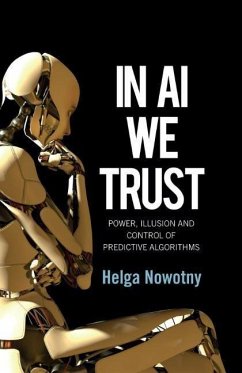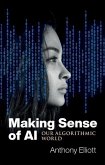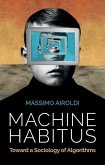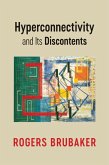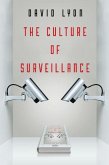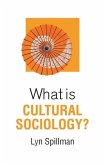One of the most persistent concerns about the future is whether it will be dominated by the predictive algorithms of AI - and, if so, what this will mean for our behaviour, for our institutions and for what it means to be human. AI changes our experience of time and the future and challenges our identities, yet we are blinded by its efficiency and fail to understand how it affects us.
At the heart of our trust in AI lies a paradox: we leverage AI to increase our control over the future and uncertainty, while at the same time the performativity of AI, the power it has to make us act in the ways it predicts, reduces our agency over the future. This happens when we forget that that we humans have created the digital technologies to which we attribute agency. These developments also challenge the narrative of progress, which played such a central role in modernity and is based on the hubris of total control. We are now moving into an era where this control is limited as AI monitors our actions, posing the threat of surveillance, but also offering the opportunity to reappropriate control and transform it into care.
As we try to adjust to a world in which algorithms, robots and avatars play an ever-increasing role, we need to understand better the limitations of AI and how their predictions affect our agency, while at the same time having the courage to embrace the uncertainty of the future.
Hinweis: Dieser Artikel kann nur an eine deutsche Lieferadresse ausgeliefert werden.
At the heart of our trust in AI lies a paradox: we leverage AI to increase our control over the future and uncertainty, while at the same time the performativity of AI, the power it has to make us act in the ways it predicts, reduces our agency over the future. This happens when we forget that that we humans have created the digital technologies to which we attribute agency. These developments also challenge the narrative of progress, which played such a central role in modernity and is based on the hubris of total control. We are now moving into an era where this control is limited as AI monitors our actions, posing the threat of surveillance, but also offering the opportunity to reappropriate control and transform it into care.
As we try to adjust to a world in which algorithms, robots and avatars play an ever-increasing role, we need to understand better the limitations of AI and how their predictions affect our agency, while at the same time having the courage to embrace the uncertainty of the future.
Hinweis: Dieser Artikel kann nur an eine deutsche Lieferadresse ausgeliefert werden.
'In this ambitious and visionary book, the brilliant Helga Nowotny offers an original analysis of the current moment, at a time when the combined challenges of the pandemic, AI and climate change may alter our future in unimaginable ways. The author's remarkable intellectual range is brought to bear on this complex constellation of social developments as she provides readers with much-needed tools for making sense of the situation. In AI We Trust should certainly be the "go-to" book for navigating the decades ahead.'
Michèle Lamont, Harvard University
'In this thoughtful and urgent book Helga Nowotny describes how the excitement of riding in digital time machines can blind us to the precariousness of our present circumstances, how imperfect predictions too readily mutate into policies, and how efficiency is more often than not a euphemism for moral indecision. This book is an important guide to the open-ended co-evolutionary future that is equal parts human spirit and mechanical appliance.'
David Krakauer, Santa Fe Institute
'Simultaneously erudite and readable, Nowotny charts a route through techno-solutionism and dystopia to help us imagine a digital future that addresses human needs. Her previous work on time and uncertainty is brought to bear in this sharp analysis of the digital and the Anthropocene. Nowotny shows how our future depends on human wisdom guiding machine "smartness".'
Sally Wyatt, Maastricht University
'Humankind has mechanized energy processing, leading to transformations so broad as to be termed industrial revolutions. We are now mechanizing the processing of information, a notion more subtle, and closer to the core of the human condition. This calls for multidisciplinary scholarship. Helga Nowotny's wise work exposes questions, sharpens perception, and inspires action.'
Bernhard Schölkopf, Max Planck Institute for Intelligent Systems, Tübingen
'A fascinating and timely meditation. Nowotny... throws out provocative questions and does not become too prescriptive -- the mark of a good book.'
Nature
Michèle Lamont, Harvard University
'In this thoughtful and urgent book Helga Nowotny describes how the excitement of riding in digital time machines can blind us to the precariousness of our present circumstances, how imperfect predictions too readily mutate into policies, and how efficiency is more often than not a euphemism for moral indecision. This book is an important guide to the open-ended co-evolutionary future that is equal parts human spirit and mechanical appliance.'
David Krakauer, Santa Fe Institute
'Simultaneously erudite and readable, Nowotny charts a route through techno-solutionism and dystopia to help us imagine a digital future that addresses human needs. Her previous work on time and uncertainty is brought to bear in this sharp analysis of the digital and the Anthropocene. Nowotny shows how our future depends on human wisdom guiding machine "smartness".'
Sally Wyatt, Maastricht University
'Humankind has mechanized energy processing, leading to transformations so broad as to be termed industrial revolutions. We are now mechanizing the processing of information, a notion more subtle, and closer to the core of the human condition. This calls for multidisciplinary scholarship. Helga Nowotny's wise work exposes questions, sharpens perception, and inspires action.'
Bernhard Schölkopf, Max Planck Institute for Intelligent Systems, Tübingen
'A fascinating and timely meditation. Nowotny... throws out provocative questions and does not become too prescriptive -- the mark of a good book.'
Nature

